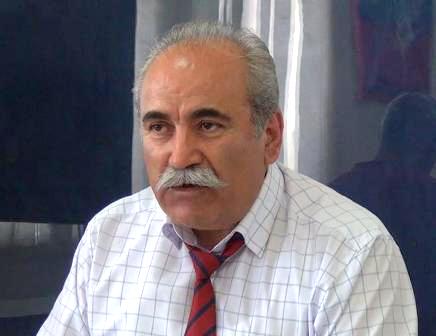Treaty of Alexandropol – 02.12.1921
On November 29, 1920, the Russian Bolshevik 11th army captured Armenia, which means that upon signing this treaty on December 2, 1920, Armenia was not an independent country. Armenia was no longer a country, moreover, this treaty was not ratified. The Treaty of Alexandropol, therefore, is NULL because it has no value by international law. Below, is the text of the inapplicable treaty.
A reproduction of the original treaty in Turkish, together with a translation into modern Turkish, appeared in Vol. II, No. 1 of “Die Welt Des Islams” (“The World of Islam”), published by the well-known book firm, E. J. Brill, Leiden, Holland.
On the one part the Turkish Government and on the other part the Armenian Republic, for the purpose of putting an end to the hostilities and to find a thesis of agreement, have sat down for an examination of the facts.
On the part of the Turkish Government:
General Kazim Kara-Bekir Pasha, Commander on the Eastern Front
Hamid Boy, Vali of Erzrum
Suleyman Negati Bey of Erzrum
On the part of the Armenian Republic:
Alexander Khadissian, Prime Minister
Avram Gulhandanian, Minister of Finance
Stepan Gorganian, Minister of the Interior
After due verification of their powers of attorney and the validity of their certificates of authority, the discussions have resulted in the following agreement:
1. State of war between Turkey and the Armenian Republic has been ended.
2. The frontier between Turkey and Armenia, (starting from the mouth of
the Lower Karasou, the River Arax, the Arpatchai, north to Kekatch, from thence to the valley of Karahan, eastern Teghnis, eastern Great Kemel, Kiziltash, major Aghbaba Mountains) is the limit, The final determination of the frontier will he decided by a mixed commission on the spot two weeks after the signature.
Armenia will not interfere in the administrative form to be chosen by general election and that administration’s jurisdiction in Mount Kouki 10,282 – 8022 – Mount Gamasour, 8160 – the village of Koutoulak – Mount Saat, 7868, – the houses in Arpatchai, 3080, Mount Kemourlu, 6930 – Sarayboulak, 8071 – the station Ararat – the southern part of the estuary of the Lower Karasou on the Araxe River (Nakhitchevan, Shahtakhti, Shamour) and the administration of this zone shall be under Turkish protection. [The numerals above are those on a military map of the time.]
3. The Government of the Grand National Assembly of Turkey may be able to consider the wishes of the Armenian Republic about the relocation of the entire native population back into the territories designated in the second article, existing in the old Ottoman boundaries which shall remain to Turkey, by irrefutable historical, ethnic and legalistic rights accepts their return by a general election within those territories, within three years after the ratification of this treaty. A mixed commission will decide the form of this.
4. So that the possibility of villainous activities and movements resulting from the incitements of imperialistic governments be once for all and permanently prevented and disallowed the Republic of Erevan undertakes not to maintain any military organization beyond a gendarmerie corps of 1500 riflemen with 8 mountain or field guns and 20 machine guns for the protection of its internal peace. There will be no military conscription in Armenia any more. The Armenian Republic is free to build fortifications and place in them as many heavy artillery pieces as it wishes for the protection of the country against external enemies. In this heavy artillery are 15 cm. shells and 15 cm. long rifles that can be used, and lesser ones used in field armies. No larger guns will be found.
5. After the peace the Government of Erevan accepts to permit the Turkish representative or ambassador in Erevan to be free to investigate all these matters at any time. In return for that the Grand National Assembly promises military assistance to Armenia in any internal or external trouble.
6. The two parties permit the return of refugees to their hearths across the old boundaries with the exception of those who, during the general war, went to the enemy’s army and took arms, and those who crossed occupied territories and participated in massacres, and mutually assure the privileges of minorities obtained in the most-civilized countries to those who repatriate themselves.
7. Those of the refugees mentioned in Article 6 who do not return to their hearths within the limit of one year after the ratification of this treaty, besides not being able to benefit from the generosity of the said article, their legal claims also will not be heard.
8. Despite the great expenses which the Grand Assembly of Turkey incurred for its army during two years because of the urgency of the war it had to wage against Armenia, it renounces its right to demand lawful damages, and in the same manner the two parties forego their rights to ask for damages because of the changes which took place as a result of the general war.
9. The Grand National Assembly of Turkey promises to render assistance in the most sincere manner for the complete formulation and defense of the Armenian Republic mentioned in the Second Article with utmost integrity.
10. The Erevan Government declares and considers void and null the Treaty (of Sevres) which was absolutely rejected by the National Grand Assembly of Turkey, and by recalling the delegations who have been tools in the hands of the imperialist countries and their government circles in the purlieus 2of Europe and America, promises its determination to eliminate all kinds of misunderstandings between the two countries; the Republic of Erevan promises to keep away from government circles those pugnacious men who run after imperialist aims and play havoc with the peace of the two nations so that it may give proof of its sincerity for the maintenance of peace and tranquility and the rights of Turkey as a good neighbor.
11. The Armenian Republic admits and vouchsafes the authority of the vicar of the chief of Sheri of the National Grand Assembly of Turkey to ratify the appointment of the chief Mufti, elected by the direct vote of muftis as well as the organization and enactment of the rights of the people living in the country for the realization of their aspirations and religious sentiments. [The chief Mufti and muftis were to be quartered in Armenia for the benefit of Moslems living there].
12. The two contracting parties mutually promise not to hinder the free passage of any person or any merchandise belonging to any person on all routes (also of Armenia and Iran), from side to side, by sea and between any country in transit operations. The Turkish government assures the freedom of transit operations between Sharour, Nakhitchevan, Shahtakht, and Djoulfa via Iran, Magou and Armenia.
The Armenian government promises not to impede general transit operations of merchandise, carriages, railroad wagons between Azerbaijan, Iran, Georgia and Turkey.
The Turkish State will take all railroads and transportation routes in the Erevan Republic under its own control in order to prevent treacherous acts against its integrity and totality by imperialists until complete peace is established and the two parties will forbid the official and unofficial agents of imperialist (Entente) powers from causing any damage or disturbance inside the Republic.
13. The government of the National Grand Assembly can take temporary military preventive measures in Armenia against attacks that may threaten its territorial integrity on condition that such measures do not disturb the rights of the Republic of Erevan conceded in this territory.
14. All treaties signed by the Republic of Erevan with any country that relate to Turkey or are harmful to the interests of Turkey, the said Republic agrees to consider absolutely null and void.
15. Commercial relations between the two parties will begin and ambassadors and consuls will be exchanged upon the signature of the treaty.
16. Regulations for telegraphic, postal, telephone, consular and commercial relations will be established by mixed commissions according to the provisions of this treaty. Meanwhile Turkey will be authorized by the State to resume telegraphic, postal and railroad communications between Armenia and occupied territories as soon as the treaty is signed.
17. In accordance with this treaty, concerning Armenia, by the provisions of the special treaty for the evacuation of territories under Turkish occupation and the repatriation and exchange of prisoners, the determination of the frontiers of the Armenian Republic will immediately be put into effect. The civilians and notables held will be delivered. The exchange of prisoners will be effected by a mixed commission.
18. This treaty is subject to ratification within a month. The ratified copies will be exchanged at Ankara. The plenipotentiary high representatives have signed this treaty of peace and frontier demarcation. This treaty, being in two copies, has been constituted at Gyumri-Alexandropol on the date 2/12/1336*. In the case of any dispute agreement can be arrived at by reference to the Turkish text.”
* December 2, 1920. The Turkish year 1336 corresponds to 1920 A.D







